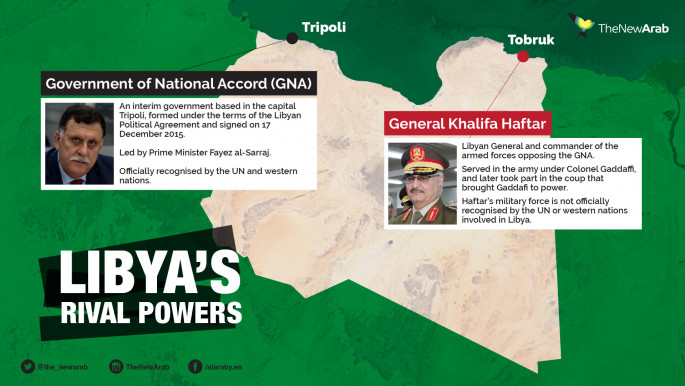Libya's Haftar announces conditional ceasefire after calls from Russia, Turkey
Turkish President Recep Tayyip Erdogan and Russian counterpart Vladimir Putin issued a joint statement on Wednesday calling for a ceasefire in Libya, but the request was initially rejected by Haftar and his self-styled Libyan National Army (LNA).
LNA spokesman spokesman Ahmed Mismari said on Saturday evening Haftar's forces would agree to a conditional ceasefire beginning 00:01 local time (22:01 GMT).
They warned, however, that the "response will be severe in the event of any violation of the truce by the opposing camp", a reference to the UN-backed government in Libya.
Tensions escalated in April last year when Haftar launched an offensive to capture the capital Tripoli from the Government of National Accord (GNA), led by Prime Minister Fayez al-Sarraj.
Egypt, the United Arab Emirates and Russia back Haftar, while the GNA is supported by Turkey and Qatar.
Putin and German Chancellor Angela Merkel met earlier on Saturday in Moscow and called for international efforts to address the crisis in Libya.
Germany and Russia are both acting as mediators in a conflict Berlin has warned could become a "second Syria" and the topic topped the agenda as they met for talks at the Kremlin.
 |
| [Click to enlarge] |
"I am really counting on the opposing sides in Libya ceasing fire, ceasing armed combat... within a few hours," Putin said. "It's important to bring an end to the armed confrontation."
Merkel, making her first visit to Russia since 2018, said she hoped "the Turkish-Russian efforts will be successful", calling a ceasefire a first step in a peace process.
Speaking in Rome after meetings with Italy's premier, Sarraj had earlier welcomed the Turkish-Russian initiative, but said any ceasefire would be conditional on a withdrawal of Haftar's forces.
Putin and Merkel both backed a Libya peace conference in Berlin being organised by UN special envoy to Libya, Ghassan Salame, which could be held in the coming weeks.
Putin called the initiative "timely" and a "very good step in the right direction."
The conference must include "countries that have a real interest in promoting a peace settlement" and decisions must be agreed preliminarily with the Libyan sides, with the involvement of Salame, he said.
While Turkey has sent troops to support the UN-backed Tripoli government, Moscow is accused of backing mercenaries supporting Haftar in his fight against the government.
Putin reiterated Moscow's denial of this, saying: "If there are Russians there, they do not represent the interests of the Russian state and do not receive money from it."
In Libya, "unfortunately large-scale military action is continuing and terrorist activity is growing," said Putin, who is keen to stress his role as a regional powerbroker.
"All this undermines stability not only in the region itself but has a negative influence on Europe," he added, citing smuggling of drugs and weapons.
He stressed the need to "restart the political process with the final aim of overcoming the split inside the country and forming single state institutions."





 Follow the Middle East's top stories in English at The New Arab on Google News
Follow the Middle East's top stories in English at The New Arab on Google News
![The UAE is widely suspected of arming the RSF militia [Getty]](/sites/default/files/styles/image_330x185/public/2024-11/GettyImages-472529908.jpg?h=69f2b9d0&itok=Yauw3YTG)
![Netanyahu furiously denounced the ICC [Getty]](/sites/default/files/styles/image_330x185/public/2024-11/GettyImages-2169352575.jpg?h=199d8c1f&itok=-vRiruf5)
![Both Hamas and the Palestinian Authority welcomed the ICC arrest warrants [Getty]](/sites/default/files/styles/image_330x185/public/2024-11/GettyImages-2178351173.jpg?h=199d8c1f&itok=TV858iVg)